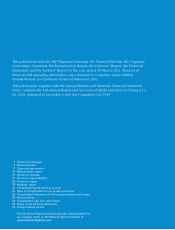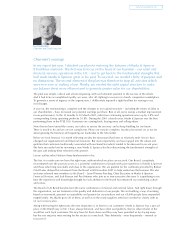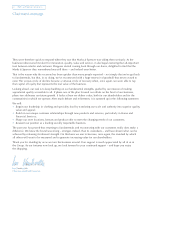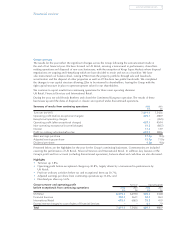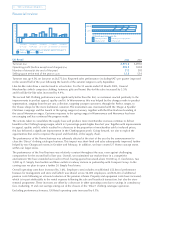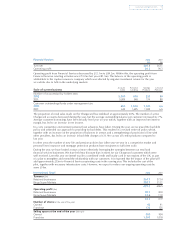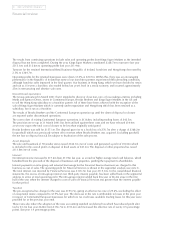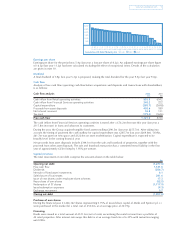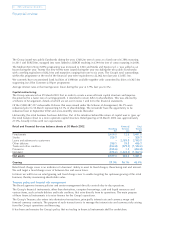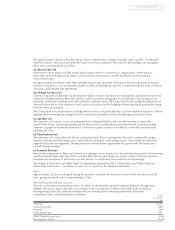Marks and Spencer 2002 Annual Report Download - page 12
Download and view the complete annual report
Please find page 12 of the 2002 Marks and Spencer annual report below. You can navigate through the pages in the report by either clicking on the pages listed below, or by using the keyword search tool below to find specific information within the annual report.
Financial review
Accounting for pensions
Financial Reporting Standard (FRS) 17 ‘Retirement Benefits’ was issued in November 2000 to replace SSAP 24
‘Accounting for Pension Costs’ and is fully effective for the accounting periods ending on or after 22 June 2003.
This year the Group has continued to account for pension costs under SSAP 24 although in accordance with the
FRS 17 transitional arrangements, certain additional disclosures are included in the notes to the financial statements.
The actuary of the Group’s UK defined benefit pension scheme carried out a formal valuation of the scheme as at
1 April 2001. This valuation revealed a shortfall of £134m in the market value of the assets of £3,102m compared
to the actuarial liability for pension benefits (a funding level of 96%).
In accordance with FRS 17, the actuary has updated the valuation of the UK scheme as at 30 March 2002.
The results of the update show that the deficit has increased to £400m (£280m after deferred tax). Details of the
assumptions used in the formal and updated valuations are given in note 11A to the financial statements.
The increase in the deficit over the year is attributable to the actuarial loss that would have been recognised through
the Statement of Total Recognised Gains and Losses if FRS 17 had been fully implemented. Approximately £60m of
the increase in the deficit over the year results from a reduction in the corporate bond rate (used to discount the
liabilities) from 6.0% to 5.9% with the balance due largely to a lower than expected value of assets in the fund.
The FRS 17 net pension liability has no impact on pension funding and as a consequence has no impact on the
Group’s current or future cash flow or reported earnings. Had the Group charged pension costs to the profit and loss
account under FRS 17, the charge would have been in the region of £100m compared to the current charge of
£148m under SSAP 24.
Outlook for 2002/03
Clothing margins should continue to improve as we anticipate an improvement of approximately 1 percentage point
in the Clothing buying margin and lower markdowns following improved performance in the second half of 2001/02.
Food sales will be adversely affected by no Easter trading periods in 2002/03 compared to two in 2001/02 and this
will impact sales by approximately 0.7% for the full year.
Underlying UK Retail operating costs for 2002/03 are budgeted to increase marginally ahead of inflation. In addition,
there will be:
•the full year impact, approximately £25m, of the sale and leaseback transaction;
•one-off costs of approximately £10m, which will be incurred principally for IT and infrastructure in preparation
for the relocation of the Corporate Head Office; and
•additional costs of approximately £15m relating to the Zip project offset by a corresponding benefit in the
Childrenswear gross margin.
Taking these into account, UK Retail operating costs will increase by approximately 5%.
In addition, the pilot of a combined credit and loyalty card will add approximately £35m to Financial Services
operating costs in the coming year. This includes both the cost of the pilot together with necessary infrastructure
costs. However, we expect our ongoing operating costs to decrease by some £10m and bad debts to return to the
level experienced in the previous year.
Going concern statement
After making enquiries, the directors have a reasonable expectation that the Group has adequate resources to
continue in operational existence for the foreseeable future. For this reason, they have adopted the going concern
basis in preparing the financial statements.
10 Marks and Spencer Group p.l.c.


